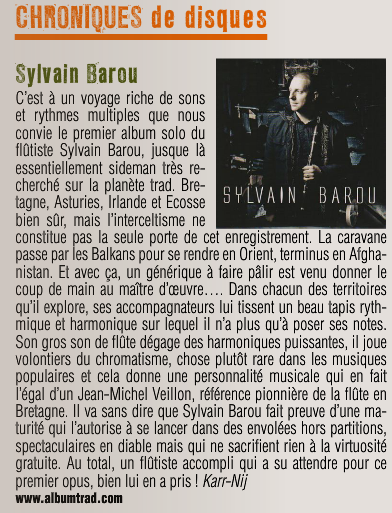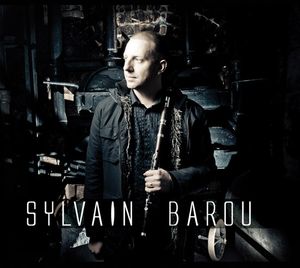Sylvain Barou
C’est à un voyage riche de sons et rythmes multiples que nous convie le premier album solo du flûtiste Sylvain Barou, jusque là essentiellement sideman très recherché sur la planète trad. Bretagne, Asturies, Irlande et Ecosse bien sûr, mais l’interceltisme ne constitue pas la seule porte de cet enregistrement. La caravane passe par les Balkans pour se rendre en Orient, terminus en Afghanistan. Et avec ça, un générique à faire pâlir est venu donner le coup de main au maître d’œuvre…. Dans chacun des territoires qu’il explore, ses accompagnateurs lui tissent un beau tapis rythmique et harmonique sur lequel il n’a plus qu’à poser ses notes. Son gros son de flûte dégage des harmoniques puissantes, il joue volontiers du chromatisme, chose plutôt rare dans les musiques populaires et cela donne une personnalité musicale qui en fait l’égal d’un Jean-Michel Veillon, référence pionnière de la flûte en Bretagne. Il va sans dire que Sylvain Barou fait preuve d’une maturité qui l’autorise à se lancer dans des envolées hors partitions, spectaculaires en diable mais qui ne sacrifient rien à la virtuosité gratuite. Au total, un flûtiste accompli qui a su attendre pour ce premier opus, bien lui en a pris ! (Karr-Nij - juin 2012) - www.albumtrad.com

C’est à un voyage riche de sons et rythmes multiples que nous convie le premier album solo du flûtiste Sylvain Barou, jusque là essentiellement sideman très recherché sur la planète trad. Bretagne, Asturies, Irlande et Ecosse bien sûr, mais l’interceltisme ne constitue pas la seule porte de cet enregistrement. La caravane passe par les Balkans pour se rendre en Orient, terminus en Afghanistan. Et avec ça, un générique à faire pâlir est venu donner le coup de main au maître d’œuvre…. Dans chacun des territoires qu’il explore, ses accompagnateurs lui tissent un beau tapis rythmique et harmonique sur lequel il n’a plus qu’à poser ses notes. Son gros son de flûte dégage des harmoniques puissantes, il joue volontiers du chromatisme, chose plutôt rare dans les musiques populaires et cela donne une personnalité musicale qui en fait l’égal d’un Jean-Michel Veillon, référence pionnière de la flûte en Bretagne. Il va sans dire que Sylvain Barou fait preuve d’une maturité qui l’autorise à se lancer dans des envolées hors partitions, spectaculaires en diable mais qui ne sacrifient rien à la virtuosité gratuite. Au total, un flûtiste accompli qui a su attendre pour ce premier opus, bien lui en a pris ! (Karr-Nij - juin 2012) - www.albumtrad.com


